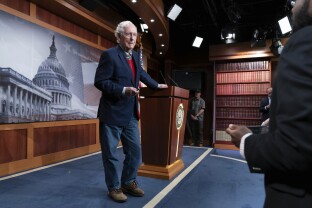Sen. Mitch McConnell is stepping down from his role atop the Senate GOP in January. But a day after Donald Trump won back the White House, the Kentucky Republican told reporters he had big plans to spend the rest of his time in the Senate as a “regular” lawmaker focused on foreign policy.
The only problem? McConnell’s foreign policy views are almost entirely at odds with Trump, who often praises dictators, criticizes U.S. allies and wants to end American assistance to Ukraine.
“It’s a lot easier to prevent war than to have one,” McConnell told reporters Wednesday morning, saying he will concentrate on just that, aiming to boost defense spending and strengthen America’s relationships with its allies.
This is the “most dangerous” time for the United States since World War II, McConnell added, and America’s adversaries are “all talking to each other.”
“They hate us, and they want to diminish our role in the world,” said McConnell, who plans to serve in the Senate through the end of his term in January 2027.
As McConnell discussed his hopes for the U.S. to take on a greater role, Trump’s isolationist inclinations are already looming large.
The president-elect has discussed withdrawing from NATO, criticized U.S. military involvement abroad and targeted close trading partners during his first administration by slapping steep tariffs on select consumer goods.
Of course, McConnell has defied Trump’s stances on foreign policy before. But on Wednesday, with Trump’s victory assured, McConnell didn’t want to get into their relationship.
“I’m here this morning to talk about the election,” he said when asked about Trump’s skepticism toward more Ukraine aid.
When NOTUS asked him if he would support Elon Musk as a potential cabinet nominee — after The Wall Street Journal reported that Musk is in contact with Vladimir Putin and has received requests from him to not deploy Starlink internet service over Taiwan, as a favor to Chinese leader Xi Jinping — McConnell refused to answer.
“I’m not going to get into that subject,” he said.
McConnell said he hopes that, as a former party leader, he will have some influence over these questions. He pushed for a $95 billion national security package with funding for Ukraine, Israel and Taiwan earlier this year, which ultimately passed Congress and was signed into law.
But given JD Vance’s impending ascension to the vice presidency — while being one of the most vocal critics of American involvement abroad — it’s not clear McConnell will find much success going forward.
Earlier this year, Vance celebrated McConnell’s announced retirement as GOP leader by saying there will be “at least a little bit of a shift, because no matter who the leader is, they’re not going to care as much about Ukraine as Mitch McConnell.”
Like Trump, Vance has argued that European allies should contribute more to Ukraine’s defense. He’s said he’s concerned that the U.S. is unprepared for potential conflict with China in the Taiwan Strait after sending munitions to Ukraine instead.
“There are a lot of critical weapons systems the Taiwanese could use right now that are, in fact, going to Ukraine,” Vance told NOTUS in an interview in February.
But would Vance support Taiwan’s defense in the event of an invasion?
“It depends on what you mean,” he said at the time. “I think we have to ramp up production of weapons systems so that we can support the Taiwanese in the event of an invasion. But I think that Taiwan is much more core to America’s national security interests than Ukraine is.”
—
Haley Byrd Wilt is a reporter at NOTUS.
Sign in
Log into your free account with your email. Don’t have one?
Check your email for a one-time code.
We sent a 4-digit code to . Enter the pin to confirm your account.
New code will be available in 1:00
Let’s try this again.
We encountered an error with the passcode sent to . Please reenter your email.


